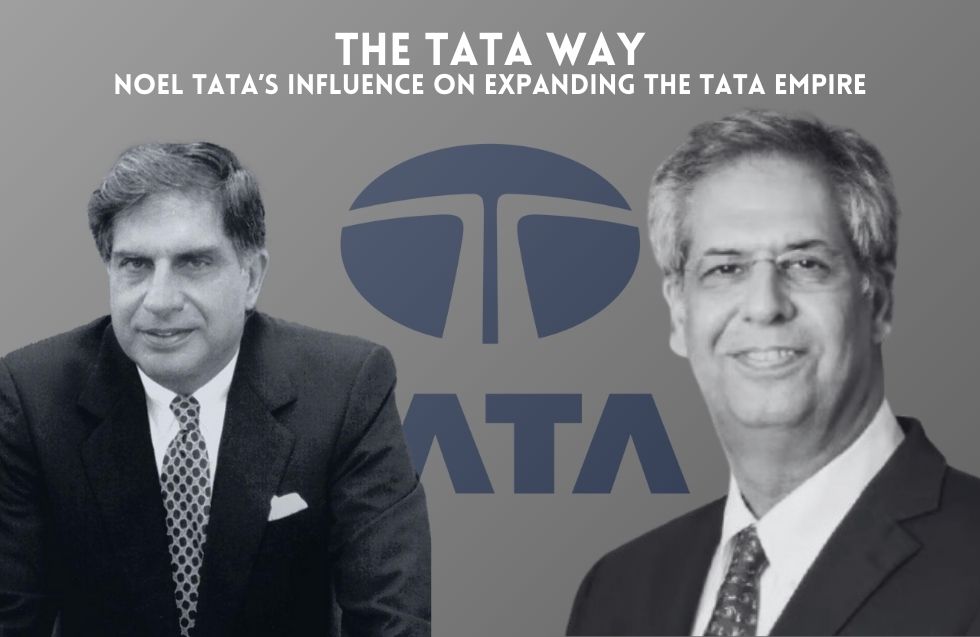The Tata Group, one of India’s most respected and expansive business conglomerates, has had a significant global presence for over a century. While the Tata legacy was primarily shaped by iconic leaders such as Jamsetji Tata, J.R.D. Tata, and Ratan Tata, a new generation of leadership emerged in the early 21st century. One of the key figures from this generation is Noel Tata, who has quietly and steadily expanded the Tata empire’s reach, especially on the international front. Noel Tata, half-brother of Ratan Tata and currently the Chairman of Tata International, has played an instrumental role in the group’s diversification, growth, and global footprint. This article delves into Noel Tata’s influence on the Tata Group’s strategic direction, his unique approach to business, and how he has upheld the Tata legacy while fostering new pathways for growth.
Building on Tradition: Noel Tata’s Vision for Tata International
The Tata Group has traditionally been known for its ethical business practices, employee-centric policies, and contribution to India’s industrial and social progress. Noel Tata has consistently aligned with these values while introducing new directions, particularly in Tata International. Under his leadership, Tata International has evolved from a traditional trading and exports company into a global entity with diverse business operations.
Tata International is now involved in automotive distribution, leather and leather products, trading of agricultural commodities, and steel fabrication and distribution, among other ventures. Much of this diversification was spearheaded by Noel Tata, who saw the potential in branching out from the core focus on steel, chemicals, and hospitality. With a background in economics from Sussex University and additional management studies from INSEAD, Noel Tata’s approach has always been a blend of international strategy and local insights, making him the ideal leader to expand Tata International’s global presence.
One of Noel Tata’s key achievements has been expanding Tata International’s footprint in Africa. India has historically held economic ties with African countries, and Noel Tata saw the potential for expanding these ties in areas like infrastructure, agriculture, and retail. Today, Tata International has operations in over 15 African countries, providing critical products and services while strengthening trade relations between India and Africa. By recognizing Africa’s untapped market potential early, Noel Tata helped the Tata Group enter new markets where competitors were few, setting a solid foundation for long-term growth.
The Retail Revolution: Noel Tata and Trent Ltd.
While Tata International grew under his leadership, Noel Tata’s most notable impact within the Tata Group may be in the retail sector. Noel Tata served as the Managing Director of Trent Ltd., Tata Group’s retail arm, where he pioneered some of the group’s most significant retail ventures. His efforts helped Tata establish a robust presence in the Indian retail market, which at the time was still nascent but brimming with potential.
Noel Tata was instrumental in developing Westside, one of India’s leading lifestyle and fashion retail brands. In the early 2000s, when foreign retail brands were limited in India, Westside became a household name by offering stylish and affordable clothing with a distinctly Indian appeal. The brand’s success reflects Noel Tata’s understanding of the Indian consumer market and his ability to cater to local tastes while maintaining international standards of quality and design. Under his leadership, Trent diversified its retail portfolio, adding Star Bazaar, a chain of hypermarkets that brought a modern grocery shopping experience to Indian consumers.
Westside’s success attracted the attention of British retail giant Tesco, leading to a joint venture between Tesco and Trent in 2014. This collaboration made Tesco the first global retail brand to establish a foothold in India’s multi-brand retail sector, marking a significant achievement for both Trent and the Tata Group. Noel Tata’s vision and strategic leadership were instrumental in this partnership, as he recognized that aligning with a global brand could bolster Trent’s growth, enhance its operational efficiency, and provide Indian consumers with a world-class shopping experience.
A Global Mindset with Local Adaptation
One of Noel Tata’s distinguishing qualities as a leader is his ability to balance global aspirations with local adaptation. He understands the importance of maintaining a consistent brand identity while customizing products and services to suit diverse markets. This approach has been particularly evident in his expansion strategy for Tata International, where he has promoted the use of local resources, hired local talent, and built partnerships with local enterprises.
For example, in Africa, Tata International established a successful automotive distribution business that initially catered to the Indian diaspora but quickly expanded to local markets by offering affordable, quality vehicles tailored to the region’s needs. Today, Tata Motors’ vehicles are widely used across Africa, contributing to infrastructure development and providing employment opportunities. Noel Tata’s emphasis on localization helped Tata International overcome common challenges faced by foreign companies operating in Africa, such as regulatory hurdles and cultural differences.
In India, Noel Tata has also emphasized the importance of meeting diverse consumer needs across urban and rural areas. With Tata Agrico, Tata International’s agricultural division, he has focused on providing high-quality agricultural implements to farmers, addressing a critical need in a predominantly agrarian economy. By supplying reliable tools at affordable prices, Tata Agrico has earned the trust of farmers and bolstered Tata International’s reputation for quality and social impact.
Quiet Leadership and Ethical Business Practices
One of the most remarkable aspects of Noel Tata’s leadership is his adherence to the Tata Group’s long-standing commitment to ethics, social responsibility, and employee welfare. While the business world is often dominated by high-profile executives, Noel Tata’s style has been understated, consistent with the Tata philosophy of putting values above personal gain. This quiet, ethical approach to leadership has not only earned him respect within the Tata Group but has also helped Tata International establish strong, trust-based relationships with partners worldwide.
For example, Tata International’s sustainable leather products business has gained recognition for its environmentally responsible practices, an area Noel Tata has passionately championed. The division has implemented waste reduction processes and developed partnerships with suppliers who adhere to environmentally friendly practices, reflecting Tata’s commitment to sustainability and ethical production. Today, Tata International’s leather products are exported to multiple countries, demonstrating that profitability and sustainability can go hand in hand.
Noel Tata has also taken steps to ensure employee welfare remains a priority. Under his leadership, Tata International has emphasized health and safety standards, implemented fair wage policies, and offered professional development opportunities for employees. These efforts are a testament to Noel Tata’s belief in treating employees as valuable stakeholders, which is a cornerstone of the Tata Group’s ethos.
The Future of Noel Tata’s Influence on the Tata Group
As the Tata Group navigates new challenges in the global economy, Noel Tata’s role is likely to continue evolving. There has been speculation about Noel Tata taking on a larger leadership role within the Tata Group, potentially as Chairman of Tata Sons. While nothing has been confirmed, his track record positions him as a strong candidate for steering the Tata Group into the next era of growth and innovation.
If he were to take on such a role, Noel Tata would bring with him extensive experience in both international markets and local industries, as well as a deep understanding of the Tata Group’s values and heritage. His strategic thinking, emphasis on sustainability, and commitment to ethical business practices would align well with the Tata Group’s future objectives, particularly in areas like renewable energy, digital transformation, and international expansion.
The Tata Way, Reimagined by Noel Tata
Noel Tata’s influence on the Tata Group exemplifies the Tata Way—an approach to business that emphasizes integrity, social responsibility, and a commitment to long-term growth. While he may not be as publicly visible as other leaders, Noel Tata’s work has left an indelible mark on the Tata Group’s international presence, especially in emerging markets. His ability to adapt to local cultures, his vision for expanding into new sectors, and his unwavering commitment to Tata’s values have made him a key architect of the Tata Group’s modern growth strategy.
In an era where the pressures of globalization and sustainability are reshaping industries, Noel Tata represents a model of responsible, forward-thinking leadership. He has not only carried forward the Tata legacy but has also redefined it for a new generation, proving that ethical business practices can coexist with innovation and expansion. As the Tata Group continues to evolve, Noel Tata’s influence will likely remain an integral part of its story, inspiring future leaders to uphold the Tata Way while navigating new frontiers in business.
Through his strategic expansions and commitment to ethical practices, Noel Tata has shown that true leadership isn’t about taking shortcuts but rather about laying down the groundwork for sustainable growth. His journey serves as a lesson for entrepreneurs and established business leaders alike: success isn’t just about reaching new heights—it’s about building a foundation that stands the test of time. In doing so, Noel Tata has not only expanded the Tata empire but also strengthened its place as one of the world’s most respected business conglomerates













